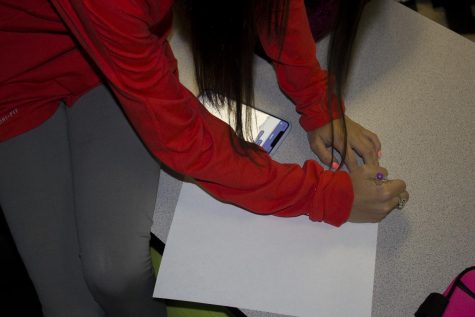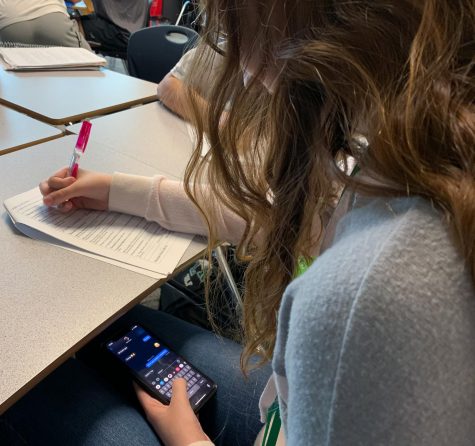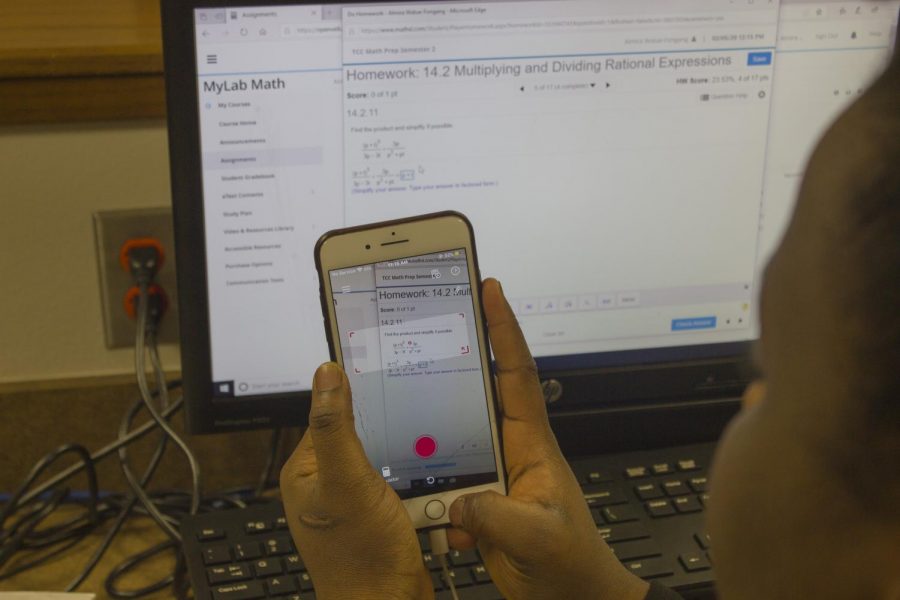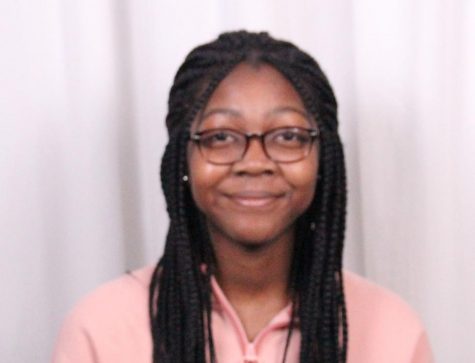How Teachers Deal with Academic Dishonesty
A student uses the app “Photomath” to help them with their math homework.
A math teacher hands out Test A to every student in rows 1, 3, and 5. The remaining rows, 2, 4, and 6, receive Test B. In order to prevent cheating from happening in his classroom, he has created different versions of the test so that students cannot easily cheat off of each other. Academic dishonesty occurs when students commit dishonest acts, such as cheating or plagiarism.
One form of academic dishonesty is cheating on assignments. This is often done without proper citation or credit to the original writer, which is considered plagiarism. AP English 3 teacher Lisa Cole says she has experienced this from students where they copy another person’s ideas online and claim them as their own.
“Students cheat on long-term writing assignments. They probably cheat in the sense that they tell each other what’s coming up on upcoming test days and quizzes. But most recently, I found cheating on long-term writing assignments where kids go on the internet and plagiaries ideas and words,” Cole said.
With years of experience in the academic field, teachers are readily able to point out which students may have used an outside resource to do their assignment. Cole says that because she knows the writing level of her students, she can tell when their writing does match their usual work ethic.
“As an English teacher, I know the skill level of these kids. So, when I read somebody’s writing and it hasn’t been that good before, I will randomly type in that sentence and ten times out of ten, I’m right. The sentence pops up and it’s from Gradesaver, Sparknotes, or other websites,” said Cole. “I just notice as I’m reading and checking their work, it doesn’t sound like them.”
For the students who are caught doing academic dishonesty, Cole finds that putting in a zero in the grade book is the most impactful punishment.
“Teachers have two ways we can go. We can punish them by writing a referral and putting them in AC or we can give them a zero. I like to make it count, so I give them the zero because I feel like that has the most effect on kids and it really follows you,” Cole said.

A student copies their English homework from the internet to complete it.
Although the student is in the wrong in this situation, Cole says that she will talk one-on-one with them, in order to give that student a chance at being honest and directly admit their actions.
“I’ll often let kids talk to me about it. They always admit it and then we talk about how much was original and how much was cheating. I will negotiate with them if I feel like they deserve a little bit more than zero, particularly if they’ve been forthcoming. If not, then I stick with the zero,” Cole said.
With the goal of preventing any form of cheating in her class, Cole says that she will implement a change in the way assignments are completed and turned in.
“The experience has taught me what to look for. The long term assignments are really designed to help, but now I’ll change the way I do it because of the cheating. I probably won’t give long-term assignments anymore that give kids the option to cheat. I will have expected them to read and give [the assignment] to them the next time in class, which is really going to mess people up,” Cole said.
Mathematics is a subject that is not necessarily based on students’ ability to write, but their ability to be consistent in their problem solving. Pre-calculus teacher Jay Ballauer, says that for his class, it is important to focus on the steps that lead toward the answer.
“In a subject like math, we’re not concerned about plagiarism, but we are concerned about the way [students] practice and making sure they’re not using their phones to get solutions. I think we focus too much on the answer sometimes, instead of the process. In math, I think a lot of students want to do less work and just put an answer down,” said Ballauer.
If students make the poor decision to cheat, Ballauer says that they should take precautions to make sure that an innocent student is not inconvenienced.
“For me, it’s more about making sure that if you’re going to choose to be dishonest, that it doesn’t affect your neighbor, that you don’t cheat off of them, in a sense of fairness. Breaking the rules isn’t about what you do wrong, it’s about how you affect others,” said Ballauer.
When a positive relationship forms between teachers and students, a trusting bond is made. According to Ballauer, that bond can be broken once a student performs academic dishonesty.
“I follow school policy. It’s less a punishment and more of a conversation to let students know that I noticed it and it’s something that affects relationships. If cheating is more important than a working relationship with your teacher, then that’s something that they need to evaluate. It’s unfortunate because it does hurt the relationship with students,” said Ballauer.
Teachers becoming stricter in their classroom can help restrict a student’s ability to cheat. However, Ballauer says that he gives students free will, and what they decide to do all depends on them.

A student sneakily uses their phone under the desk to get answers from their friend.
“I’m sure there would be something I could change. Certainly, I could ban phones. I could hawk over people while they’re taking tests. There’s a lot of things that I could do, but I think at the end of the day, I choose to allow students to make those decisions,” said Ballauer.
Additionally, Ballauer wants students to understand that integrity is an important trait to carry because it guides you to make good choices.
“Character is what you do when the doors are closed. That’s where I would want students to learn something. I’m going to give you freedom to make some decisions and I hope you would make the right ones. Otherwise, no one’s going to be holding your hand in life and making you make the right decisions. Good decision making has to start here,” said Ballauer.
As the Academic Associate Principal of Lake Ridge, Sharlonda Kennedy oversees education in the school. Kennedy says that teachers don’t necessarily yearn to punish students, but instead want to teach them a lesson they can learn from.
“I think as educators and teachers in general, we don’t want to have to issue consequences when it comes to things like that. But, we want to be able to provide teachable moments for students. Sometimes students don’t even understand that what they did is academic dishonesty. I don’t think it’s always intentional or malicious,” Kennedy said.
While there is no single, definite reason for students committing this wrongdoing, Kennedy says that a student’s work load, whether it is inside or outside of school, is a contributing factor to their offense.
“Sometimes students do [academic dishonesty] because their load is so heavy. Not only are they taking their workload, but they also do extracurricular activities. A lot of our students work to help their families. If teachers could be mindful of how much work they’re putting on students, that could be helpful; and that’s in regards to homework, daily assignments, and things like that,” Kennedy said.
Kennedy believes that because a teacher does their job by educating in the classroom, how the student decides to utilize the information they receive can prove what they understand by themselves, as an individual.
“But at the end of the day, when we talk about a major test grade where they’re trying to share answers or a writing assignment where there’s plagiarism, teachers have to be active and monitor. I think our teachers do a whole lot already by giving different versions of tests to minimize cheating taking place,” said Kennedy. “I think they do a great job of trying to prepare students for the material, so at the end of the day, we want to know what students know and what they’ve mastered. When they’re sharing and copying someone else’s work, it doesn’t allow for what they know to come through. It’s not the the right thing to do.”



